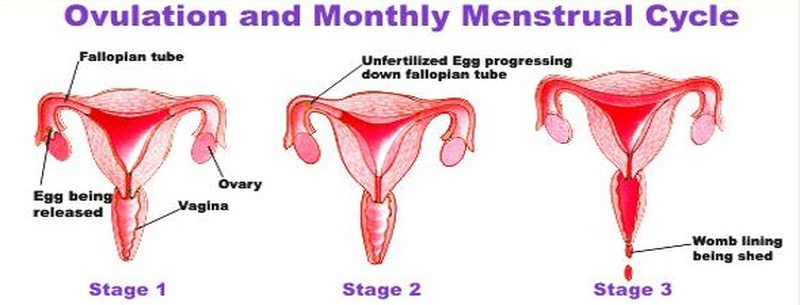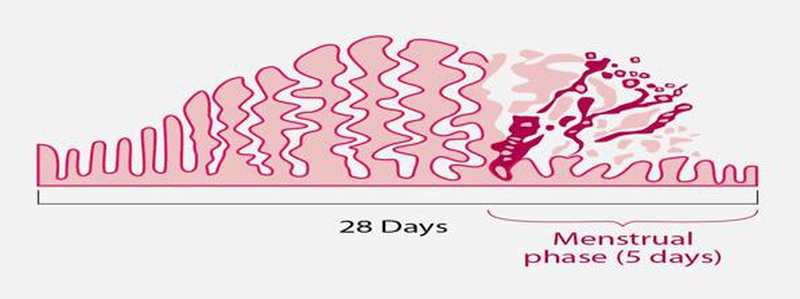A common topic of discussion among girls happens to be periods. What is it? Why do girls have periods? Is it normal? Does it affect the body? There are many questions looming in their heads regarding the same. Hope you find all the answers that you are looking for, here.
Menarche, commonly known as period, is the body’s way of signalling that it is now ready to have a baby. Generally a young girl, or a lady experiences the menstrual flow (or period) anywhere from 2 days, right up to 7 days. It is the condition where the blood, as well as, tissue leaves the body, passing out through the vagina.

Why Do Girls Have Periods?
What’s Going On?
Why do girls have periods? Because all the tissue and blood which leaves their body, is no longer required by it. These come from the uterus, the organ inside the woman’s baby where the baby undergoes growth, until the time of birth.
All female humans have two ovaries, and each one of these has thousands of eggs in it. One of these tiny eggs is released every month. An ovary releases an egg for the first cycle, and skips a turn since the second one release it in the next cycle. This then travels down the fallopian tubes which lead to the uterus.
Every single month, since the girl hits puberty, the uterus prepares to receive a baby by building up on tissue and blood. This will be required in case a male sperm fertilises the egg which is released once every month. If the egg does get fertilised, then it gets attached to this well prepared lining. When attached properly, this fertilised egg grows to become a baby.
Generally, the egg remains unfertilised, leading to shedding of this lining (composing of tissue, blood and the unfertilised egg), which results in the occurrence of the period.
The cycle begins all over again with the uterus preparing itself to receive a baby by cushioning the uterus. Two weeks after the previous period, another egg gets released into the womb. This should satisfy the question, why do girls have periods?
What Is a Menstrual Cycle?
Generally, when people mention menstrual cycle, they refer to those days when the body is removing the blood and tissue from the uterus, through the vagina. However, this is the only part of the entire menstrual cycle which is visible.
Menstrual cycle lasts for about a month. A normal cycle, among girls or teens, lasts anywhere from 21 days to 45 days. Usually, a week during this period involves the menstrual fluid being removed from the body. This period tends to last anywhere from 2 days to 7 days.
Apart from the one week when the girl, experiences periods, there are no visible signs of the menstrual cycle. However, there are a number of things going on inside the body. The uterus is preparing itself to welcome a baby and then an egg gets released. The cycle keeps continuing itself again and again, until an egg gets fertilised and develops into a foetus.
When Do the Periods Begin?
Usually the question, why do girls have periods, is accompanied with, when does it begin? Most of the girls tend to begin menstruating between the ages of 10 to 15 years. Although the average age to begin experiencing periods is considered to be 12 years, every girl’s body undergoes to this change in its own time.
There is possibly no way of telling exactly when the girl will begin menstruating. However, there are some tell tale signs that indicate the cycle will begin soon. A very obvious sign is the occurrence of breasts. Typically, a period begins a couple of years after the breasts begin to develop. Another visible sign is the vaginal discharge.
What Is Normal?
Now that we know the reason why do girls have periods, it is also important to know what is considered to be normal. Since the menstrual periods are completely new to every girl when they begin, it is only natural for one to feel confused regarding the whole thing. It can also be hard to figure out exactly what is normal, and what isn’t. It does help to talk to a grown woman, since they have all been there and experienced these changes in their bodies.
If you are experiencing from any of the below mentioned things, then it is best to talk to the doctor, as this isn’t normal.
Experiencing periods which last a lot longer than a single week
Excessive bleeding
Missing periods for more than 3 months
Bleeding in between regular periods
Experiencing excessive pain during the period or even before it begins
Extremely irregular periods
What If the Periods Are Irregular?
Among women or older girls, the periods tend to stick to a pattern. The complete cycle generally lasts for the same period of time. Even the number of days when they experience bleeding remains the same. Although they may be irregular initially, eventually it does become completely regular. A great way of keeping track of the periods is by tracking it using a calendar.
Slowly but surely, the periods tend to get regular and also shorter. If this does not occur, then talking to a doctor may be a good idea.
How to Deal With the Cramps?
More often than not, periods are accompanied with a minor pain. Generally the basic pain killing medications like ibuprofen do the trick and help in getting rid of the pain. Some of the other things that can be followed to help deal with the pain are as follows:
Exercise regularly
Relaxation or meditation
Using heating pads on the lower abdomen
If the pain is preventing you from leading a regular life or participating in the activities that you normally enjoy, then it is time to visit the doctor for some solution.
Conclusion
So there is everything you should know regarding why do girls have periods. It is absolutely normal to be apprehensive regarding getting your first period. In case you have already experienced one, then it is okay to hate the inconveniences which it causes. But at the same time, it is also a reason to celebrate. It is the body’s way of signalling that it is ready to have a baby. In other words, your body is absolutely healthy and is developing exactly the way it should.



View All Comments /Add Comment